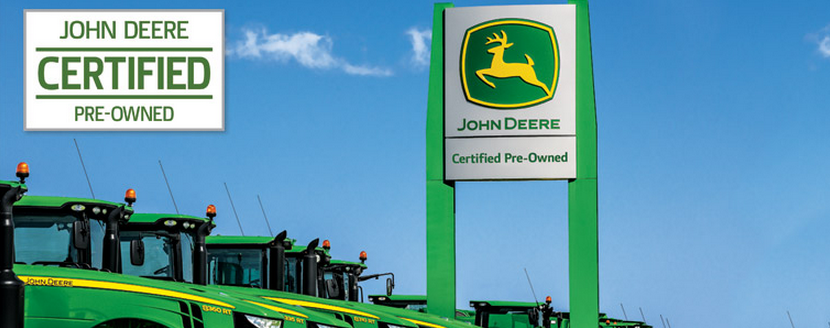High farm incomes in recent years led many United States farmers towards purchasing an abundance of new equipment. As a result, dealers have been left with high inventory levels of used farm equipment because purchases of new large machines often times involve a trade-in of older models.
Much like buying a used car, purchasing used agriculture equipment can require an abundance of research and examination prior to the acquisition. John Deere has recognized the increasing number of used machines on dealers’ lots and has put a Certified Pre-Owned Equipment program in place to provide customers with peace of mind and understanding of what they’re getting out of their purchase when they sign on the dotted line. Let’s take a look at the new CPO program at a glance as well as some of the features that make it one-of-a-kind in the used equipment market.
John Deere CPO at a Glance: The Certified Pre-Owned program was created to assist Deere customers that are looking for field-ready used machines with up-to-date technology and features to increase productivity levels on the farm. This program presents producers that haven’t upgraded their equipment fleet in a few years with an excellent opportunity to do so, and do so with confidence. Current qualified models for the CPO program include STS/S-Series combines up to two model years old with 1,000 engine hours or less and 8R/8RT, 9030 and 9R/9RT Series tractors up to three model years old with 1,500 engine hours or less.
Tractor Inspection: Prior to receiving CPO recognition, Deere’s qualified 4WD tractors need to be examined by a John Deere technician and pass more than 170 points of inspection, including:
| Tires |
|
| Engine |
|
| Cooling System |
|
| Fuel System |
|
| Electrical System |
|
| Power Train |
|
| Steering/Brakes |
|
| Operator’s Stations |
|
| Hitch and Hydraulic Systems |
|
| Miscellaneous |
|
Combine Inspection: Much like the tractor certification process, Deere’s qualified combines must first pass a technician-performed test of more than 200 inspection points, including:
| Tires |
|
| Control System |
|
| FeederHouse Area |
|
| Feed Accelerator (Fast) |
|
| Combine Left Side |
|
| Combine Right Side |
|
| Engine Compartment |
|
| Grain Tank Section |
|
| Cab |
|
| Safety |
|
PowerGuard: As mentioned previously, peace of mind is essential when purchasing used agriculture equipment. As part of the CPO program, every qualified piece of equipment comes with a one-year PowerGuard protection plan that covers all the main components of the engine, transmission, final drives, hubs, steering components, electronics, hydraulics, cab, and air conditioning.To learn more about the CPO program, visit MachineFinder’s John Deere CPO page.
Purchasing used agriculture equipment can now be done with supreme confidence thanks to John Deere’s new CPO program. If you enjoyed this post or want to read others, feel free to connect with us on Facebook!
